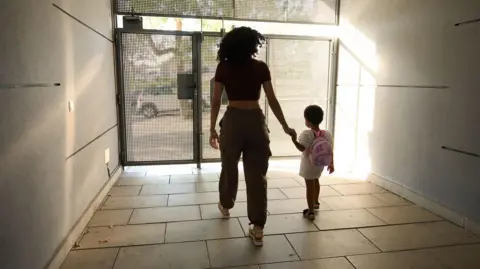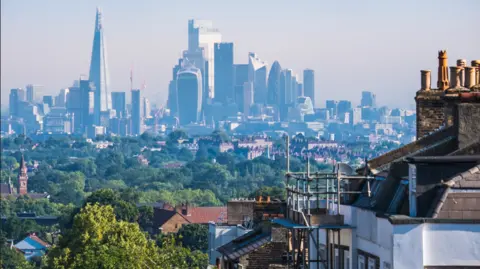'I kept pretending everything was normal'
 Getty Images
Getty Images"He was asking questions about why we were moving again."
Khadija, a mum from south London, recalls how she struggled to answer the questions her son asked her when they were living in temporary accommodation.
"Why we were sharing accommodation with others, why he had no space to play, I kept pretending everything was normal and we would get our place one day and be finally happy.
"I kept spending lots of time outside in coffee shops to stay warm and to avoid my son getting dirty playing outside as we had no laundry available."
'Broken system'
Khadija's experience is highlighted in a new report from Citizens UK and Trust for London that reveals the "dire state" of temporary accommodation in London.
One in 49 Londoners are homeless and in temporary accommodation.
The report says thousands of families are trapped in what it describes as "a broken system", and are going without cooking facilities, somewhere to wash clothes, reliable internet and storage for belongings.
As a result children can face long journeys to school, parents are cut off from support networks, and under-resourced local services struggle to cope with rising demand.
More than 70,000 homeless households in London are currently living in temporary residences provided by their local council, often a hostel or budget hotel room with limited facilities.
Newham has the highest number, 6,667, followed by Lambeth with 4,657 and Southwark with 3,828.
 Getty Images
Getty ImagesFreedom of Information requests to the capital's councils show that one family with children has been living in temporary accommodation in Croydon since 1998.
Citizens UK's research found that London's councils place on average 43% of households outside of their boundaries, but some of London's most affluent authorities place significantly higher percentages.
Bromley, Richmond upon Thames and Merton are among the least disadvantaged areas but place some of the highest percentages of their residents outside their boundaries at more than 75%.
By contrast Brent and Barking and Dagenham councils, which have high levels of deprivation, place 6% of their households in temporary accommodation outside their boundaries.
'Devastating impact'
The cost of storing belongings is also highlighted in the report with some people travelling miles to access items and others accruing debt to maintain the storage.
Islington Council charges households £130 before belongings can be taken into storage and £40 thereafter if households wish to access them.
In Enfield, households are subject to a £30 charge each time they access their belongings.
Grace Williams, London Councils' executive member for housing, told the Local Democracy Reporting Service: "London is the epicentre of the worsening homelessness emergency, with the capital accounting for over half of all households in temporary accommodation in England.
"Homelessness has a devastating impact on too many Londoners.
"In the face of a chronic shortage of affordable accommodation, boroughs increasingly find ourselves forced to use the least-worst options to keep a roof over the heads of homeless families."
She added: "Boroughs are seeking urgent government action to tackle the fundamental factors behind homelessness – particularly through investing far more in affordable housing."
A Ministry of Housing, Communities and Local Government spokesman said: "The government inherited a serious housing crisis which is why we are taking urgent and decisive action to end homelessness, fix the foundations of local government and drive forward our Plan for Change."
Citizens UK is calling for the establishment of a Right to Wash, encouraging local authorities to support households to wash and dry their clothing and to stop charging them to use laundry facilities.
The campaign group also calls on councils not to work with third-party storage providers that charge for access.
Listen to the best of BBC Radio London on Sounds and follow BBC London on Facebook, X and Instagram. Send your story ideas to [email protected]
